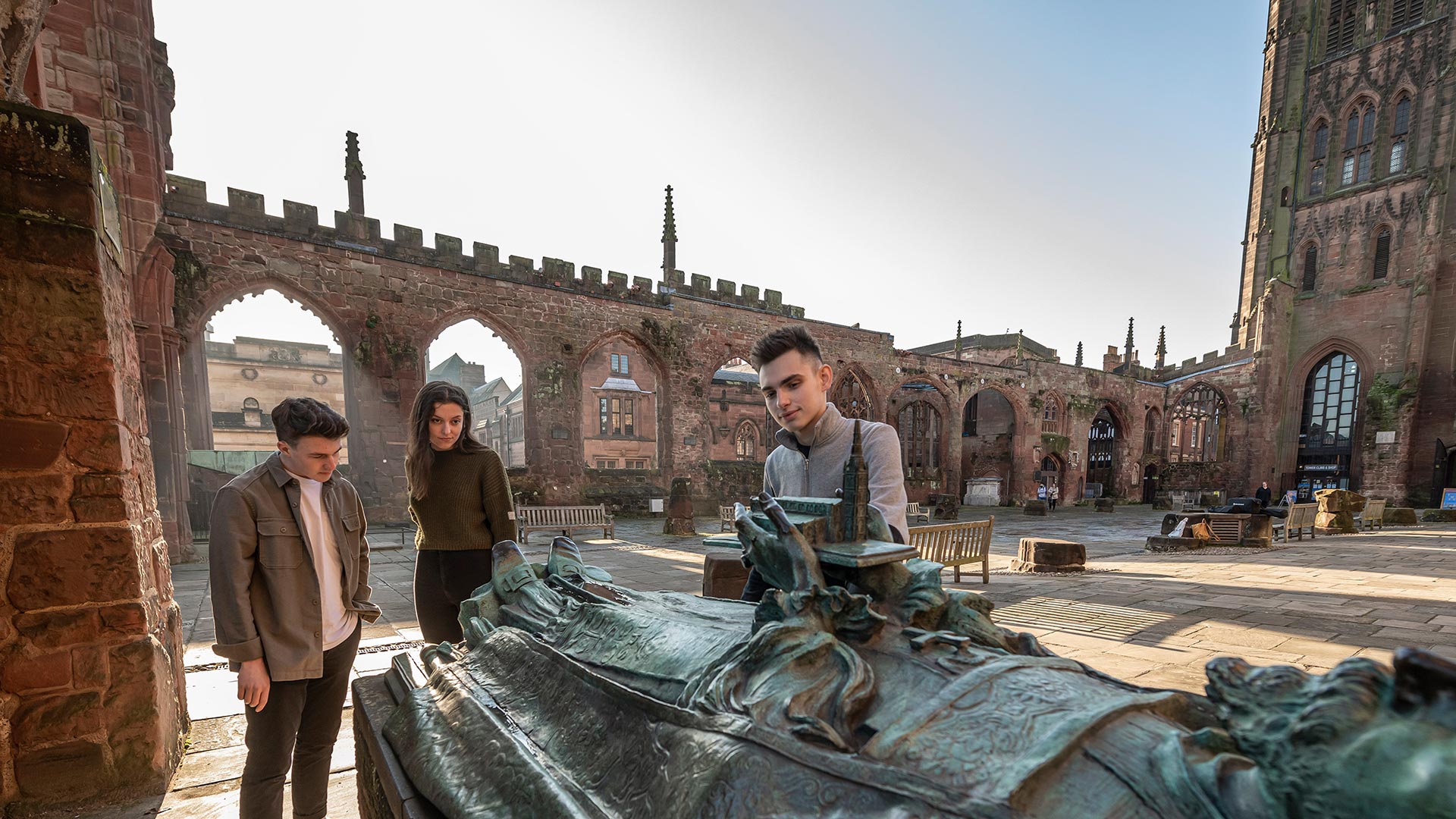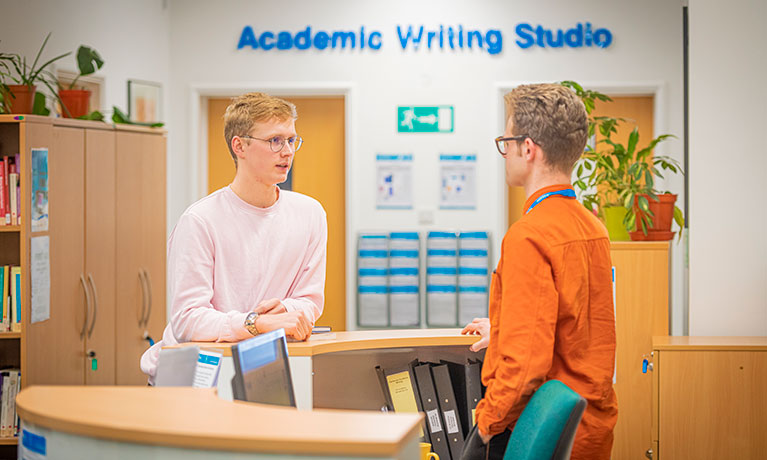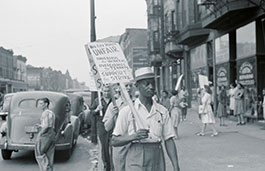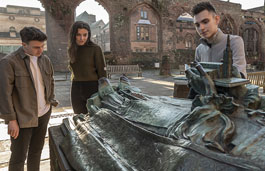Search
History BA (Hons)
Study level: Undergraduate
Explore the past through a global lens with a hands-on history course that sparks creativity, critical thinking and real-world skills.
Year of entry
Location
Coventry University (Coventry)
Study mode
Full-time
Sandwich
Duration
3 years full-time
4 years sandwich
Course code
V140
Start date
September 2026
Course overview
Every day, history is made as discoveries and fresh perspectives change the way we see the world. This course invites you to be part of that transformation, unlocking the past and building new skills through hands-on, project-based learning.
- Dive into the past: tackle a range of compelling topics, from the medieval era to the rise of civil rights, the history of pop culture, espionage, conflict, ideology, empire, colonisation (and its resistance) and protest.
- Project-based learning: explore the past creatively, setting out to solve real-world problems while developing highly transferable skills such as critical thinking, collaboration and communication.
- Intercultural knowledge: gain a global perspective of the past that spans many different cultures. Explore history through a lens that will take you from the lives of ordinary people in the medieval world to the enslaved and Indigenous peoples, and to the spies, soldiers and leaders who fought across centuries of warfare.
Rated Gold Overall
Teaching Excellence Framework (TEF) 20235 QS Stars for Teaching and Facilities
QS Stars University RatingsTop 5 Student City in England (Coventry)
QS Best Student Cities Index 2026Why you should study this course
- Global perspective: study histories of a wide range of regions, from the Americas and Europe to the medieval Near East and Africa.
- Learn by doing: work with original documents and objects from history under the guidance of subject experts. Engage in immersive learning experiences and gain experience making videos and podcasts, analysing documents and objects, and curating exhibitions.
- Beyond the written word: build a broad portfolio throughout this course, from writing essays to creating podcasts and learning how to produce short documentaries and other industry-relevant material.
- Positive student experience: in the National Student Survey (NSS) 2024, this course scored 96% satisfaction for ‘Teaching on my Course’ and 100% satisfaction for ‘Academic Support’, ‘Mental Health and Wellbeing Services and Freedom of Expression’.
- Employability: become proficient at research, communication, and interpretation while also gaining experience in media production and content creation. These skills should appeal to a variety of employers such as the civil service, schools, media organisations, political entities and the corporate world.
What you'll study
This course has a common first year.
The common first year enables you to work alongside students doing similar courses to you, to widen your knowledge and exposure to other subject areas and professions. You will have the opportunity to collaborate with other students, so you can share your insights and experience which will help you to develop and learn.
If you discover an interest in a specific subject you have studied, upon successful completion of your first year, you could swap degrees with another course in your common first year (subject to meeting progression requirements).
Common first year courses
- History BA (Hons)
- History and Politics BA (Hons)
- International Relations BA (Hons)
- Politics BA (Hons)
- Politics and International Relations BA (Hons)
We regularly review our course content, to make it relevant and current for the benefit of our students. For these reasons, course modules may be updated.
How you'll learn
Teaching on this course takes a global perspective, helping you to develop an international outlook that is sensitive to the changing nature of the world in which we live. You'll learn through hands-on activities and real-world examples, using the same approaches professionals use in the field. It’s about creating experiences that allow you to apply knowledge, gain confidence and feel prepared for your future career.
Teaching methods may include:
- crisis simulations such as Model United Nations and historic emulations, allowing you to apply knowledge to simulated real-world settings
- interactive lectures that help to make learning relatable, relevant and engaging
- immersive workshops and seminars which help to develop key skills that will empower you to pursue a wide range of careers
- regular ‘course hours’ that allow you to meet your lecturers and course director and build a sense of community within your subject area.
Teaching contact hours
As a full-time undergraduate student, you will study modules totalling 120 credits each academic year. You will normally study one 30-credit module at a time. A typical 30-credit module requires a total of 300 hours of study made up of teaching contact hours, guided and independent study.
Teaching hours
Teaching hours may vary depending on your year of study and selected modules. During your first year, you can expect 12-15 teaching hours each week. You will also have the option to attend additional sessions, including time with a progress coach or to meet with staff for advice and feedback. As you progress through your studies, teaching hours may reduce.
Guided and independent study
Throughout your studies, you will be expected to spend time in guided and independent study to make up the required study hours per module. You’ll be digging deeper into topics, review what you’ve learned and complete assignments. This can be completed around your personal commitments. As you progress through your studies, you’ll spend more time in independent study.
Online learning
As an innovative university, we use different teaching methods including online tools and emerging technologies. So, some of your teaching hours and assessments may be delivered online.
Assessment
This course incorporates new and innovative assessment methods aligned with current industry standards, providing you with practical, real-world skills designed to advance your professional readiness and career prospects.
Assessment methods may include:
- writing exercises such as essays, reports, policy reviews and briefings
- live simulations and reflective journals
- individual and group presentations
- curation and public communication
- podcasts, academic posters and other media projects.
The Coventry University Group assessment strategy ensures that our courses are fairly assessed and allows us to monitor student progression towards achieving the intended learning outcomes.
International experience opportunities
You will have the opportunity to apply to take part in an additional study abroad year2 to provide you with greater experiences and expand your understanding of the subject matter. You will also have the opportunity to take part in Collaborative Online International Learning with peers in international institutions.
Please note that all international experience opportunities may be subject to additional costs, competitive application, availability, and meeting applicable visa and travel requirements, and are therefore not guaranteed2.
Entry requirements
Typical entry requirements:
Fees and funding
| Student | Full-time | Part-time |
|---|---|---|
| UK, Ireland*, Channel Islands or Isle of Man | 2026/27 fees TBC 2025/26 fees: £9,535 per year |
Not available |
| EU | 2026/27 fees TBC 2025/26 fees: £9,535 per year with EU Support Bursary** 2026/27 fees TBC 2025/26 fees: £16,800 per year without EU Support Bursary** |
Not available |
| International | 2026/27 fees TBC 2025/26 fees: £16,800 per year |
Not available |
If you choose to study this course with a professional placement2 or study abroad year, you will need to pay a tuition fee3 to cover your academic support throughout your placement year. Students commencing their professional placement in the academic year 2027/28 will pay £1,500 if they are paying UK fees, or £1,800 if they are paying international fees.
For advice and guidance on tuition fees and student loans visit our Undergraduate Finance page and see The University’s Tuition Fee and Refund Terms and Conditions.
The University will charge the tuition fees that are stated in the above table for the first Academic Year of study. The University will review tuition fees each year. For UK (home) students, if Parliament permits an increase in tuition fees, the university may increase fees for each subsequent year of study in line with any such changes. Note that any increase is expected to be in line with inflation.
If you choose to study this course with a professional placement, the University will charge the tuition fees stated above for those on a placement during Academic Year 2027/28. The University will review professional placement tuition fees each year. For UK (home) students, the University may increase fees for each subsequent year of study, but such that it will be no more than 5% above inflation.
For international students, we may increase fees each year, but such increases will be no more than 5% above inflation. If you defer your course start date or have to extend your studies beyond the normal duration of the course (e.g. to repeat a year or resit examinations) the University reserves the right to charge you fees at a higher rate and/or in accordance with any legislative changes during the additional period of study.
We offer a range of International scholarships to students all over the world. For more information, visit our International Scholarships page.
Tuition fees cover the cost of your teaching, assessments, facilities and support services. There may be additional costs not covered by this fee such as accommodation and living costs, recommended reading books, stationery, printing and re-assessments should you need them. Find out what's included in your tuition costs.
The following are additional costs not included in the tuition fees:
- Any optional overseas field trips or visits: £400+ per trip.
- Any costs associated with securing, attending or completing a placement (whether in the UK or abroad).
*Irish student fees
The rights of Irish residents to study in the UK are preserved under the Common Travel Area arrangement. If you are an Irish student and meet the residency criteria, you can study in England, pay the same level of tuition fees as English students and utilise the Tuition Fee Loan.
**EU Support Bursary
Following the UK's exit from the European Union, we are offering financial support to all eligible EU students who wish to study an undergraduate or a postgraduate degree with us full-time. This bursary will be used to offset the cost of your tuition fees to bring them in line with that of UK students. Students studying a degree with a foundation year with us are not eligible for the bursary.
Facilities
Students will benefit from studying on our well-equipped, modern campus4.

Delia Derbyshire Building
The Delia Derbyshire complex offers more space to learn, design and make, including a hyper-studio for students across all disciplines to collaborate on projects together, a gallery space and an events atrium.

The Library
You will benefit from our personalised support and industry-relevant teaching and resources, which are designed to help you succeed. These include our modern library with academic-liaison librarians who provide specialist help and support throughout your degree.

Academic support
No matter which degree you’re studying, you’ll find a lot of support on campus, including the Centre of Academic Writing and sigma, which offers mathematics and statistics support.
Facilities are subject to availability. Access to some facilities (including some teaching and learning spaces) may vary from those advertised and/or may have reduced availability or restrictions where the university is following public authority guidance, decisions or orders.
Careers and opportunities
Throughout the course, you should develop a broad range of highly valued skills to reflect the changing and dynamic needs of industry, including exceptional communication, project planning, critical thinking and analysis, crisis management, problem solving, and powerful presentation and listening skills.
On successful completion of the course, you should be a globally and interculturally aware graduate ready to make a dynamic difference in the world. You could find yourself working in the following roles:
- Teaching
- Documentary researcher
- Civil service roles
- Museum-based roles
- Finance manager
- NGO, international organisations and charity roles.
The graduate destinations listed above illustrate potential career paths. You may need to gain additional qualifications or practical experience, pass professional examinations, complete training, cover associated costs and meet specific visa or immigration requirements to secure employment in these fields.
Further study
You can choose to continue your studies at Coventry University with the History MA. You may be entitled to an alumni discount on your fees if you decide to extend your time with us by progressing from undergraduate to postgraduate study.

Discover Phoenix+
Phoenix+ brings you together with other students to learn, experience and develop essential knowledge and skills. Whatever destination you choose, it's about preparing you for life after university.
Learn more about Phoenix+How to apply
You may also like

History and Politics BA (Hons)

International Relations BA (Hons)






